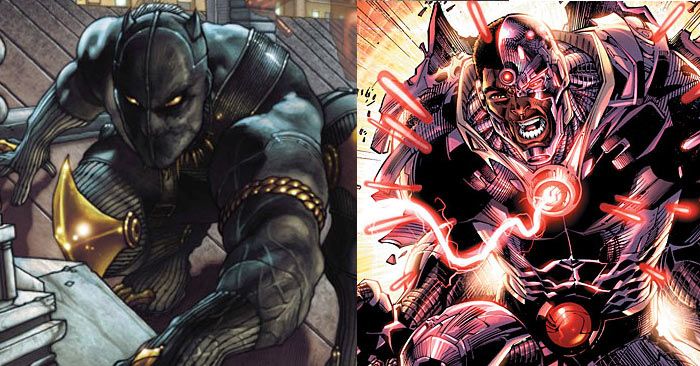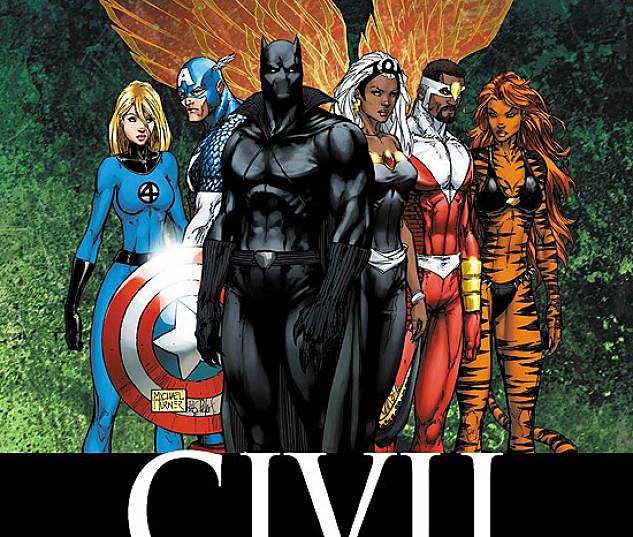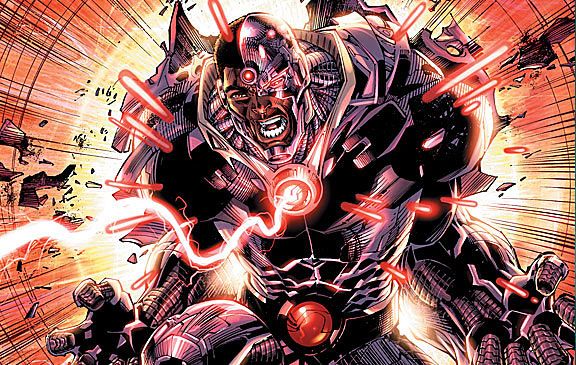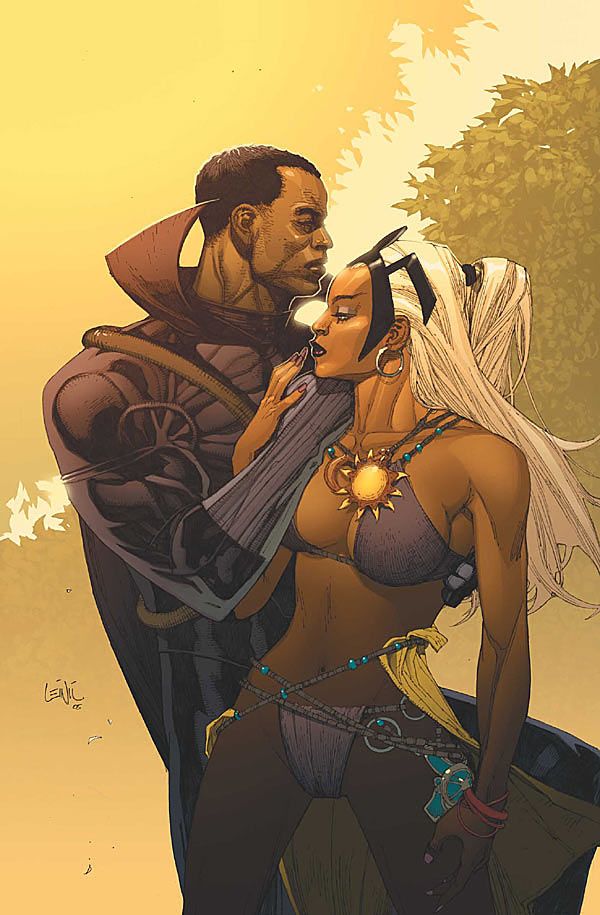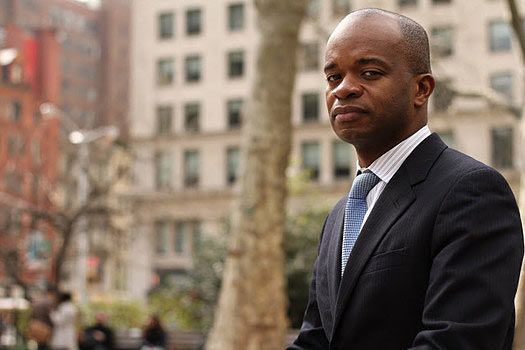Within the last month, both Warner Bros. and Marvel Studios have released their multi-film slates for their cinematic superhero universes. The lineups are impressive in their breadth, implied story structure and marketing potential, and show character diversity.
Quite noteworthy is that each of the studios has, in their lineups, a film with a Black male lead, based on a superhero from their comic book universe source materials.
Warner Bros. has announced a "Cyborg" film for release in 2020, based on the African-American technology-wielding hero of the same name.
Marvel Studios has announced a "Black Panther" film for release in 2017, based on the African tribal king of the same name.
Both heroes are well known by the fans, have a history spanning at least thirty years each, and through membership are associated with the most popular team franchises in both universes.
While a number of fans want to believe with all of their hearts that the progressiveness implied by the presence of Black male superheroes in major multi-franchise movie rosters is about a morally-based acknowledgement of Black people (and to some degree that's probably true), it's entirely possible it's more about money.
THE COLOR BARRIER: Hollywood's New "Fantastic Four" & Effective Brainwashing
In one of my past columns for my first series here at CBR, titled "The Color Barrier: Hollywood's New 'Fantastic Four' and Effective Brainwashing," I referred to the statistic that Black people will have a projected buying power of 1.1 trillion dollars by 2015.
That's a lot of power for corporations to make a concerted effort to get, and providing more Black characters in high-profile media is certainly one way to attract the consumers with that buying power. For those consumers, the presence of Black characters isn't just about, "That's right. We're in the world, too," or, "It's about time you recognize," or even, "No, duh."
It's the power of actualization through visualization.
Whether it's Buddhism or business strategy, it's a popular idea that human beings need to see something so they can consider the destination possible, to become a leader, a fighter, a President, and while superheroes aren't real, the concepts they symbolize are well-grounded in real life wants and needs.
To be attractive. To be potent. To be wealthy. To be able to command resources, and go beyond limits imposed on one by self and society to achieve incredible things.
Since Black men are one of the most feared by the American status quo, they, especially, want and need to see themselves visualized in a positive light.
Since Black women want to see, for reasons of attraction in various contexts, Black men as caring, commanding, handsome, and realizing their financial and emotional growth potential, they want to see Black men visualized in a positive light.
Since men and women from other ethnic and cultural backgrounds recognize qualities in the Black man, qualities which activate interests either emotional or carnal or both, they want to see Black men visualized in a positive light.
So there is no question that Black masculinity is marketable, but when we look at the characters of the Black Panther and Cyborg, what take on this idea do we see?
The Black Panther is King T'Challa, royal leader of the African nation of Wakanda. Wakanda is a technologically-advanced society which managed to defeat the colonial forces responsible for enslaving many Africans. T'Challa is handsome, intelligent, strategic, loving, engaging and formidable in combat.
Cyborg is Victor Stone, a former athlete who was the victim of a laboratory accident. Victor was scarred and almost killed, and to save his life, his scientist father and various other experts grafted various technologies to his body, turning him into a one-man fighting machine.
Both Cyborg and the Black Panther have human stories at the core of their mythology, with drama and pathos and heroism. They have the benefit of friends and allies, but in some ways are both solitary in their exclusive understanding of their own burdens and trials.
These heroes were created with good intentions by progressive writers and artists, and the maintenance of these characters/intellectual properties is on the shoulders of their company owners and the officers they hire to manage ideas for mass consumption.
If that mass consumption is directly connected to the idea of actualization through visualization, which of these heroes would a Black man want to be?
A scarred man with technology grafted to his body, or the king of an impressive African nation?
Well, that's easy.
But the deeper issue is how and why Cyborg, after 34 years of publication by one of the two most powerful and profitable comic book companies, during this time when the subjects of Science, Engineering, Technology and Math are part of the educational and social narrative, how Cyborg can still hold up as he is.
Cyborg represents the convergence of the STEM fields, athleticism, and vital teenage youth.
I won't get into the fact that he exists in a universe where heroes can travel through time and to other dimensions, thus the technology to address his disfigurement could be addressed. This isn't science fiction, it's superhero comics, so that argument wouldn't wash for long.
The thing... is that Cyborg has the potential to be a multi-layered symbol for the young Black men who will grow to spend their hard-earned monies on entertainment that provides the means for actualization through visualization.
In the character's present form, Cyborg cannot maximize appeal to the various audiences who want to see the Black man portrayed in a positive, heroic light.
And someone can say that's narrow-minded because Cyborg's disfigurement doesn't make him any less of a man, and they would be right, but it certainly makes him less potent as an icon with universal appeal.
It affects the impact of his symbolism.
Cyborg was interesting to me in my adolescence, but certainly not in my forties.
I would much rather be The Black Panther.
TO: The Powers That Be at Warner Brothers
FROM: Whosoever wishes to inform you of this problem
DATE: Today
RE: Cyborg and representation in the 21st Century
You still have time.
Joseph Phillip Illidge is the Head Writer for Verge Entertainment (www.verge.tv), a production company co-founded with Shawn Martinbrough, artist for the graphic novel series "Thief of Thieves" by "The Walking Dead" creator Robert Kirkman, and videogame developer Milo Stone. Verge has developed an extensive library of intellectual properties for transmedia development. Live-action and animated television and film, videogames, graphic novels, and web-based entertainment.
Joseph has been a public speaker on the subjects of race, comics, and politics at Digital Book World's forum, Digitize Your Career: Marketing and Editing 2.0, Skidmore College, Purdue University, on the panel "Diversity in Comics: Race, Ethnicity, Gender and Sexual Orientation in American Comic Books," and at the Soho Gallery for Digital Art in New York City.
His latest project is "The Ren," a 200-page graphic novel about the romance between a young musician from the South and a Harlem-born dancer in 1925, set against the backdrop of a crime war and spotlighting the relationship between art and the underworld. "The Ren" will be published by First Second Books, a division of Macmillan.
["The Mission" banner designed by Gavin Motnyk.]

